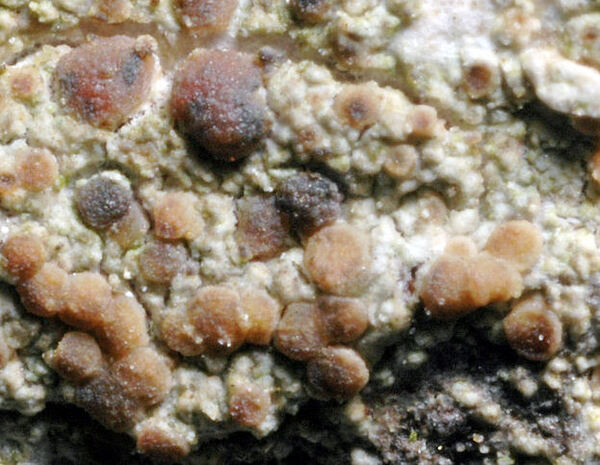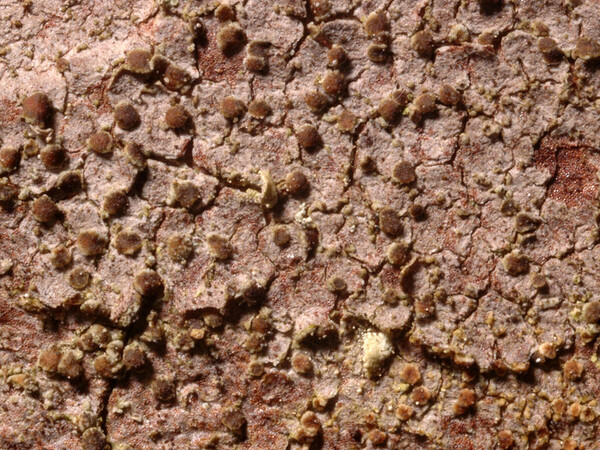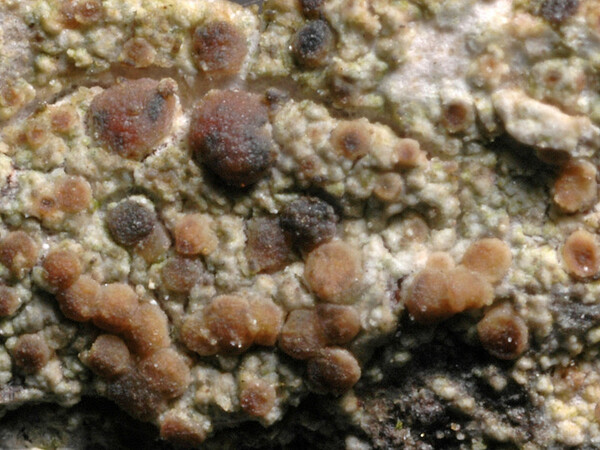Lecanora hypoptella (Nyl.) Grummann
Cat. Lich. Germ.: 19, 1963. Basionym: Lecidea hypoptella Nyl. - Flora, 48: 146, 1865.
Synonyms: Lecanora symmictiza (Nyl.) Hedl.; Lecidea symmictiza Nyl.
Distribution: N - Ven, TAA (Nascimbene 2013, Nascimbene & al. 2014, 2022, Trindade & al. 2021).
Description: Thallus crustose, thinly episubstratic, sometimes poorly evident, continuous to rimose, whitish or grey. Apothecia lecanorine only when young, later biatorine, 0.2-0.5 mm across, sessile, with a convex, pale to dark brown, often black-dotted disc, and a thin, soon excluded thalline margin. Exciple of radiating hyphae, without algae or with a few algae at the base only; epithecium patchily brown black, without crystals; hymenium colourless, 35-55 μm high; paraphyses lax in K, with distinctly swollen, brown-black apical cells; hypothecium colourless. Asci 8-spored, clavate, very thin-walled, with a K/I+ blue, tall tholus penetrated by a faintly amyloid apical cushion, the wall K/I-, surrounded by a blue outer layer, Lecanora-type. Ascospores 1-celled, hyaline, narrowly ellipsoid, 8-15 x 3-4.5 μm, often guttulate and appearing 1-septate. Pycnidia black, semi-immersed. Conidia 2-4 × 1.5 μm. Photobiont chlorococcoid. Spot tests: thallus K-, C-, KC-, P-, UV-. Chemistry: without lichen substances. Note: a mainly boreal-montane lichen found on lignum and acid bark in upland areas; it belongs to a poorly known group and is widespread in Scandinavia, being also known from the British Isles, France, central Europe, and the mountains of the Iberian Peninsula; perhaps more widespread in the Alps.
Growth form: Crustose
Substrata: bark and lignum
Photobiont: green algae other than Trentepohlia
Reproductive strategy: mainly sexual
Commonnes-rarity: (info)
Alpine belt: absent
Subalpine belt: very rare
Oromediterranean belt: very rare
Montane belt: extremely rare
Submediterranean belt: absent
Padanian area: absent
Humid submediterranean belt: absent
Humid mediterranean belt: absent
Dry mediterranean belt: absent

Predictive model
Herbarium samples
Growth form: Crustose
Substrata: bark and lignum
Photobiont: green algae other than Trentepohlia
Reproductive strategy: mainly sexual
Commonnes-rarity: (info)
Alpine belt: absent
Subalpine belt: very rare
Oromediterranean belt: very rare
Montane belt: extremely rare
Submediterranean belt: absent
Padanian area: absent
Humid submediterranean belt: absent
Humid mediterranean belt: absent
Dry mediterranean belt: absent

Predictive model
| Herbarium samples |
 INDEX FUNGORUM
INDEX FUNGORUM
 GBIF
GBIF
 DOLICHENS
DOLICHENS




